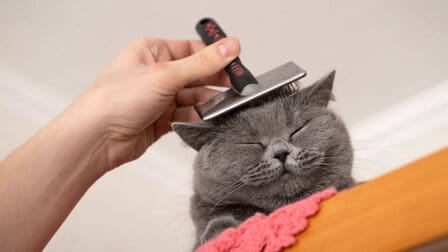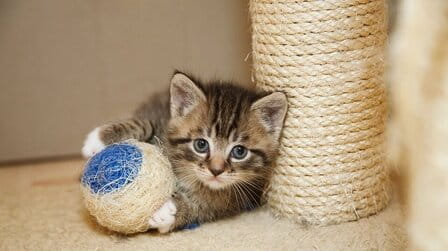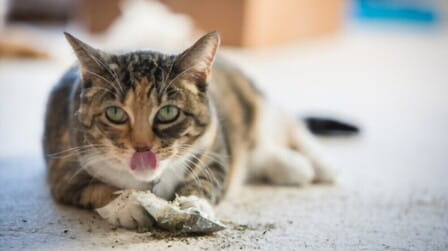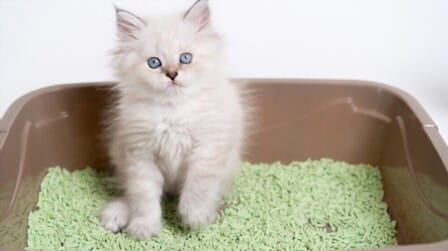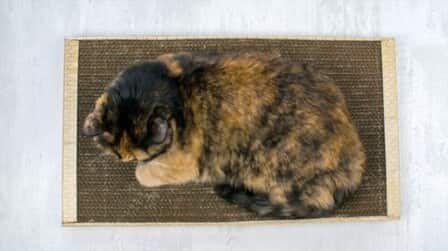The smell of cat urine is unmistakable. So if your cat starts spraying or marking in your home, you'll likely notice it right away. This behavior is something that many cat owners experience and it's not a big deal. It only becomes serious when you take corrective steps and it continues to spray.
Spraying is a natural behavior for a cat, but if you have trained your cat to use a litter box and it continues to pee in the house or defecate anywhere but the litter box, sand is probably the cause.
Cat urine has a strong odor, which can cause stains on carpets and furniture. So this is a nuisance for cat owners. There are ways on how to prevent cats from spraying if your cat has this behavior.
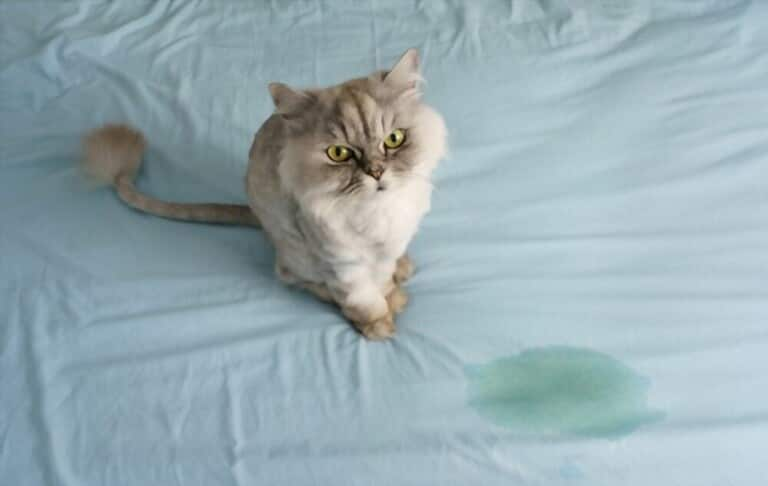
The difference between the act of spraying urine and urinating.
Urine spraying, also known as urine marking, is communication behavior that can result from a variety of factors. On the contrary, urinating is a natural urge, usually only related to a litter box problem.
• Cats often choose vertical surfaces to perform urine marking. The amount of urine in this case is also less than when the cat urinates normally.
• Urine sprayed by cats has a stronger odor, which is because they release chemicals to send signals to other cats.
Find out why cats spray
Urine spray is a way for cats to communicate with other cats, and the key to solving this problem is understanding what the cat is trying to communicate.
• Cats are possessive and like territorial claims. Urine spray is a way for your cat to let other cats know of his presence and which areas of the home belong to him. This is the "declaration of sovereignty".
• Urine spraying is also a mating behavior of cats. They often engage in this behavior during the mating season, and the pheromones in cat urine send the message that they are ready to breed.
There also have some other reasons, such as:
• Do you have a new baby or another pet at home? If so, your cat probably feels threatened and wants to mark its territory.
• Does the neighbor's cat enter your yard causing your cat to feel stressed?Will there be any changes in the cat's routine? Cats don't like change, and sometimes they will behave badly if their daily routines change.
• Do you have cats in your home? Do the cats living in your home have enough space?
• Have there been any recent changes to the cat litter box?
Here are some suggested methods to prevent cat spraying:
1. Maintain a daily routine.
Changes in the home can cause stress, make cats insecure and lead to their claimant behavior. If your cat exhibits this behavior, a steady routine can help relieve stress and stop spraying.
• Feed your cat at the same time each day, and put the cat's litter box, bed, and toys in a certain place.
• If you have friends over, move the cat to another room. This is especially important if your guests also have cats and the cat scent permeates their clothes. This can stress your cat and lead to spray behavior.
• Some pheromone sprays available at most pet stores are effective in calming cats. If you know that a big change is coming in your home, like a new member or pet, for example, such a spray can help during the acclimation stage.
2. Make sure the cats in the house have enough space.

If your home has many cats, the spraying behavior is usually due to their territorial nature.
- Provide plenty of resting places for cats up high. Cats like to climb up high to observe. You can also clean out your window sills, make room for bookshelves, or buy a cat treehouse at a pet store.
- Keep a variety of food, water, scratching posts and cat toys available.
- Provide a variety of litter boxes for cats. Although a cat's spitting behavior is different from normal urination, a lack of toilet space will stimulate their territory-marking response, of which urine spraying is an example. You should buy at least two sandboxes and clean both boxes daily.
3. Clean cat urine.

Repeated spraying behavior is often due to the cat's response to the smell in cat urine, especially in homes with many cats. Pet odors must be removed to prevent this from happening again.
- Wash all washables in a washing machine with regular soap.
- Mix a solution of 50% water and 50% white vinegar, pour it into a spray bottle to clean the places where the cat has sprayed urine. This solution can deodorize and prevent cats from continuing to spray in those places.
- Pet stores and even supermarkets sell cleaners that contain synthetic pheromones and enzymes that deodorize and prevent your cat's spraying behavior.
4. Limit your cat's exposure to the outside.
Usually, conflict with the neighbor's cat will lead to the cat's spraying behavior. Even if your cat is not allowed outside, they can still see or smell other cats through the window and begin to react by spraying.
- Move furniture that cats often lie on away from windows. Consider buying a treehouse for your cats to give them another place to rest.
- Close windows, curtains or doors.
- Consider installing a motion sensor in the lawn sprinkler so the water is sprayed towards the cat as it approaches the window.
5. Help your cat adjust to new family members.
A newborn baby in the house can cause the cat to spray to ensure its territory is not invaded. You need to help the cat through the transition so it doesn't start to engage in this behavior.
- Maintain a routine, despite difficulties. When you have a baby, your routine in your home will change dramatically. You should try to maintain the routine of feeding, sleeping, and cleaning the litter box as much as possible.
- Before the baby is born, don't pay much attention to the cat, because it will get used to it. This can frustrate the cat even more when the baby shows up in the house and it will react to get attention.
- Introduce your cat to new toys and baby supplies by letting her smell and explore the item after opening. Anything that is new or has an unfamiliar smell can cause urinary incontinence in cats.
6. Seek medical intervention

7. Checkup by taking your cat to the vet.
While cat spray is often a behavioral problem, if home remedies don't work, you may need to take your cat to the vet for an examination. A physical exam can rule out or identify and treat any medical problems that could be the cause of this behavior. Problems with bladder control, especially in older cats, can be a sign of serious illnesses, such as organ failure.
8. Seek medical help
Spraying behavior, even when caused by stress or anxiety, can be treated with a number of medications prescribed by your veterinarian.
- You can buy an oral antidepressant and anti-anxiety medication for your cat by taking your cat to the vet. These medications can ease stress caused by a large number of cats in the home or ease anxiety caused by fluctuating lifestyles.
- Always consult your veterinarian and know your cat's medical history. Certain medical problems can interact badly with certain medications.
- All medications can have potential side effects. You should ask your doctor about side effects to watch out for and their severity before giving your cat any medication.
Conclusion
Never scold a cat. Cats don't respond to positive or negative reinforcement as much as dogs, and yelling can add stress and make problems worse.
You need to make sure your cat is spraying, not just urinating. Urinating outside the litter box can be a sign of a health problem in your cat. Surely you don't want to fail in handling when you confuse these two behaviors.

